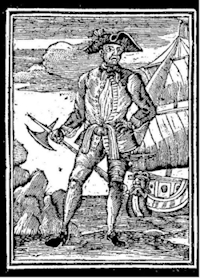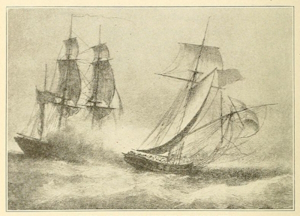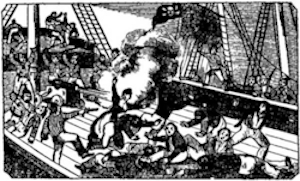“He had a great deal of good Nature, and did not want for Courage; he was not avaritious, and always averse to the ill Usage of Prisoners received.”
— Charles Johnson on Edward England in A General History of the Pyrates, 1724.
 Although not the most well-known pirate captain, Edward England was considered important enough to receive his own chapter in Charles Johnson’s A General History of the Pyrates. It is thought by some that his real name might have been Jasper Seegar, although others dispute this, claiming this name belonged to different pirate. England was born around 1685 in Ireland and was possibly a Catholic and a Jacobite. He started his career as a sailor and probably fought in the Spanish War of Succession as a privateer. After the war he found employment as a mate aboard a merchant sloop sailing out of Jamaica until it was captured by a pirate ship commanded by Christopher Winter.…
Although not the most well-known pirate captain, Edward England was considered important enough to receive his own chapter in Charles Johnson’s A General History of the Pyrates. It is thought by some that his real name might have been Jasper Seegar, although others dispute this, claiming this name belonged to different pirate. England was born around 1685 in Ireland and was possibly a Catholic and a Jacobite. He started his career as a sailor and probably fought in the Spanish War of Succession as a privateer. After the war he found employment as a mate aboard a merchant sloop sailing out of Jamaica until it was captured by a pirate ship commanded by Christopher Winter.…

 This act was passed during the reign of William III. The main purpose behind the statute was to make some corrections to the Offences at Sea Act 1536. These changes included allowing for acts of piracy to be “examined, inquired of, tried, heard and determined, and adjudged in any place at sea, or upon the land, in any of his Majesty’s islands, plantations, colonies, dominions, forts, or factories”. This enabled admirals to hold a court session to hear the trials of pirates in any place they deemed necessary, rather than requiring that the trial be held in England, thus avoiding the costly and time-consuming transport of captured pirates across the Atlantic. It also meant those accused of piracy didn’t necessarily have to be tried by a jury.
This act was passed during the reign of William III. The main purpose behind the statute was to make some corrections to the Offences at Sea Act 1536. These changes included allowing for acts of piracy to be “examined, inquired of, tried, heard and determined, and adjudged in any place at sea, or upon the land, in any of his Majesty’s islands, plantations, colonies, dominions, forts, or factories”. This enabled admirals to hold a court session to hear the trials of pirates in any place they deemed necessary, rather than requiring that the trial be held in England, thus avoiding the costly and time-consuming transport of captured pirates across the Atlantic. It also meant those accused of piracy didn’t necessarily have to be tried by a jury. By the time the Great Fire occurred, London was by far the largest city in England. Its inhabitants numbering between 300,000 and 400,000, it had become a crowded, unregulated sprawl of houses. This wasn’t the first large scale fire, the city having experienced several major fires in the past, the most recent having been in 1633. Additionally, London had been hit by an epidemic of bubonic plague called the Great Plague of London only the year before, during which between 60,000 and 100,000 are thought to have died. As well as disease, fires were always a danger in a city made mostly of timber and tar paper. There were so many possible causes: fireplaces, candles, ovens, lamps, as well a large stores of combustibles such as pitch and hemp. To combat the perpetual danger, there were watchmen, also known as bellmen, who patrolled the city at night, who sounded the alarm should a fire break out.…
By the time the Great Fire occurred, London was by far the largest city in England. Its inhabitants numbering between 300,000 and 400,000, it had become a crowded, unregulated sprawl of houses. This wasn’t the first large scale fire, the city having experienced several major fires in the past, the most recent having been in 1633. Additionally, London had been hit by an epidemic of bubonic plague called the Great Plague of London only the year before, during which between 60,000 and 100,000 are thought to have died. As well as disease, fires were always a danger in a city made mostly of timber and tar paper. There were so many possible causes: fireplaces, candles, ovens, lamps, as well a large stores of combustibles such as pitch and hemp. To combat the perpetual danger, there were watchmen, also known as bellmen, who patrolled the city at night, who sounded the alarm should a fire break out.… This law was enacted during the reign of Charles II and its full name was An Act to prevent the delivery up of Merchants Shipps, and for the Increase of good and serviceable Shipping. It came into being because the captains and crews of merchant vessels commonly refused to fight when attacked by pirates. The act stipulated that ships of 200 tons or more possessing at least sixteen guns were required to fight, as long as the pirate vessel didn’t have twice as many guns. Failing to resist would result in the commander being excluded from any further commands of English ships and even imprisonment.
This law was enacted during the reign of Charles II and its full name was An Act to prevent the delivery up of Merchants Shipps, and for the Increase of good and serviceable Shipping. It came into being because the captains and crews of merchant vessels commonly refused to fight when attacked by pirates. The act stipulated that ships of 200 tons or more possessing at least sixteen guns were required to fight, as long as the pirate vessel didn’t have twice as many guns. Failing to resist would result in the commander being excluded from any further commands of English ships and even imprisonment.